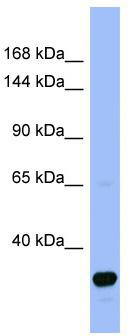FANCA Rabbit Polyclonal Antibody
Frequently bought together (2)
Transient overexpression lysate of Fanconi anemia, complementation group A (FANCA), transcript variant 2
USD 396.00
Other products for "FANCA"
Specifications
| Product Data | |
| Applications | WB |
| Recommended Dilution | WB |
| Reactivities | Human |
| Host | Rabbit |
| Isotype | IgG |
| Clonality | Polyclonal |
| Immunogen | The immunogen for anti-FANCA antibody: synthetic peptide directed towards the N terminal of human FANCA. Synthetic peptide located within the following region: KLSLSKVIDCDSSEAYANHSSSFIGSALQDQASRLGVPVGILSAGMVASS |
| Formulation | Liquid. Purified antibody supplied in 1x PBS buffer with 0.09% (w/v) sodium azide and 2% sucrose. Note that this product is shipped as lyophilized powder to China customers. |
| Purification | Affinity Purified |
| Conjugation | Unconjugated |
| Storage | Store at -20°C as received. |
| Stability | Stable for 12 months from date of receipt. |
| Predicted Protein Size | 33 kDa |
| Gene Name | Fanconi anemia complementation group A |
| Database Link | |
| Background | The Fanconi anemia complementation group (FANC) currently includes FANCA, FANCB, FANCC, FANCD1 (also called BRCA2), FANCD2, FANCE, FANCF, FANCG, FANCI, FANCJ (also called BRIP1), FANCL, FANCM and FANCN (also called PALB2). The previously defined group FANCH is the same as FANCA. Fanconi anemia is a genetically heterogeneous recessive disorder characterized by cytogenetic instability, hypersensitivity to DNA crosslinking agents, increased chromosomal breakage, and defective DNA repair. The members of the Fanconi anemia complementation group do not share sequence similarity; they are related by their assembly into a common nuclear protein complex. This gene encodes the protein for complementation group A. Alternative splicing results in multiple transcript variants encoding different isoforms. Mutations in this gene are the most common cause of Fanconi anemia. [provided by RefSeq, Jul 2008] |
| Synonyms | FA; FA-H; FA1; FAA; FACA; FAH; FANCH |
| Note | Immunogen Sequence Homology: Pig: 100%; Human: 100%; Dog: 92%; Rat: 92%; Mouse: 92%; Bovine: 83%; Guinea pig: 79% |
| Reference Data | |
| Protein Families | Druggable Genome |
Documents
| Product Manuals |
| FAQs |
| SDS |
{0} Product Review(s)
0 Product Review(s)
Submit review
Be the first one to submit a review
Product Citations
*Delivery time may vary from web posted schedule. Occasional delays may occur due to unforeseen
complexities in the preparation of your product. International customers may expect an additional 1-2 weeks
in shipping.






























































































































































































































































 Germany
Germany
 Japan
Japan
 United Kingdom
United Kingdom
 China
China



